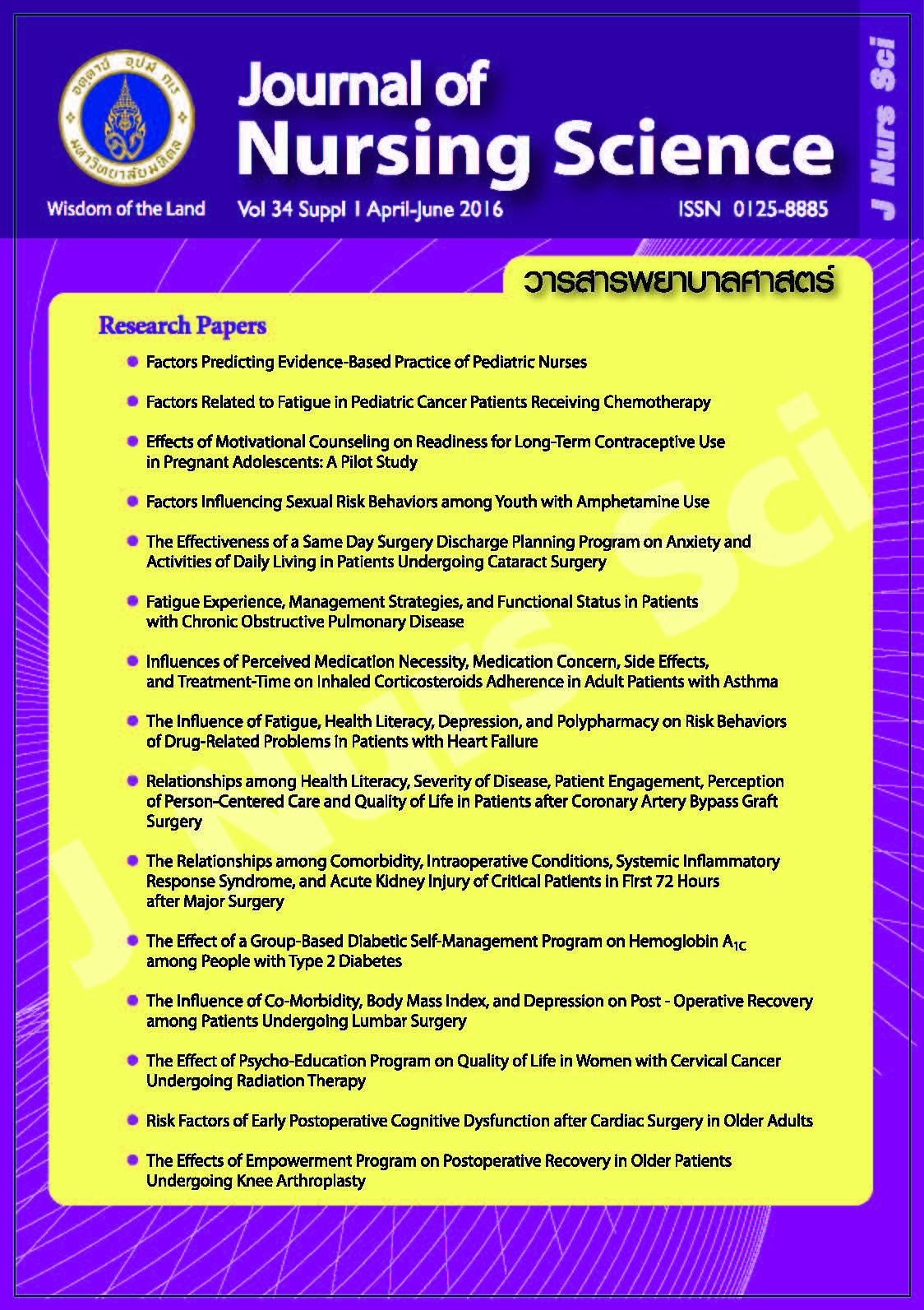The Effects of Empowerment Program on Postoperative Recovery in Older Patients Undergoing Knee Arthroplasty
Main Article Content
Abstract
Abstract
Purpose: To study the effects of an empowerment program on postoperative recovery in older patients undergoing knee arthroplasty.
Design: Quasi-experimental research.
Methods: The sample composed of 60 older patients who treated with knee arthroplasty at one tertiary hospital in Bangkok. The subjects were selected by inclusion criteria and divided into 30 subjects in the control group and 30 subjects in the experimental group. The experimental group
entered an empowerment program according to the stages of the Gibson’s concept. The tools for data collection included: a demographic data form, a perceived self-efficacy in leg muscles exercise interview
form, and a functional ability of knee interview form (Modified WOMAC Scale). Data were analyzed by using descriptive statistics, Wilcoxon signed-rank test, Mann Whitney U test, X2-test, Kolmogorov–Smirnov test and t-test.
Main findings: After participating in the program, the experimental group had significantly higher scores of perceived self-efficacy in leg muscles exercise than prior to the program (p < .05), and also had significantly higher scores than those in the control group (p < .05). The experimental group had significantly higher postoperative recovery score than those in the control group (p < .05).
Conclusion and recommendations: The empowerment program resulted in improving postoperative recovery of older patients who underwent knee arthroplasty. It should be encouraged and should apply this empowerment program in nursing care for postoperative recovery improvement.
ผลของโปรแกรมการเสริมสร้างพลังอำนาจต่อการฟื้นสภาพหลังผ่าตัดของผู้สูงอายุที่ได้รับการผ่าตัดเปลี่ยนข้อเข่าเทียม
บทคัดย่อ
วัตถุประสงค์: เพื่อศึกษาผลของโปรแกรมการเสริมสร้างพลังอำนาจต่อการฟื้นสภาพหลังการผ่าตัดของผู้สูงอายุที่ได้รับการผ่าตัดเปลี่ยนข้อเข่าเทียม
รูปแบบการวิจัย: การวิจัยกึ่งทดลอง
วิธีดำเนินการวิจัย: กลุ่มตัวอย่างเป็นผู้สูงอายุ จำนวน 60 คน ที่มารับการรักษาโดยการผ่าตัดเปลี่ยนข้อเข่าเทียม ที่โรงพยาบาลตติยภูมิแห่งหนึ่ง ในกรุงเทพมหานคร คัดเลือกกลุ่มตัวอย่างตามเกณฑ์การคัดเข้า แบ่งเป็นกลุ่มควบคุมและกลุ่มทดลองกลุ่มละ 30 คน กลุ่มควบคุมได้รับการดูแลตามปกติ กลุ่มทดลองได้รับโปรแกรมเสริมสร้างพลังอำนาจตามกระบวนการของ Gibson เครื่องมือที่ใช้ในการเก็บรวบรวมข้อมูลประกอบด้วย แบบสัมภาษณ์ข้อมูลส่วนบุคคล แบบสัมภาษณ์การรับรู้ความสามารถตนเองในการออกกำลังกล้ามเนื้อขา และแบบสัมภาษณ์การทำหน้าที่ของข้อเข่า (Modified WOMAC Scale) การวิเคราะห์ข้อมูลใช้สถิติเชิงบรรยาย, Wilcoxon signed-rank test, Mann Whitney U test, X2-test, Kolmogorov–Smirnov test และ t-test.
ผลการวิจัย: ภายหลังเข้าร่วมโปรแกรม พบว่า กลุ่มทดลองมีคะแนนการรับรู้ความสามารถตนเองในการออกกำลังกล้ามเนื้อขามากกว่าก่อนได้รับโปรแกรมอย่างมีนัยสำคัญทางสถิติ (p < .05) และมีคะแนนการรับรู้ความสามารถตนเองในการออกกำลังกล้ามเนื้อขามากกว่ากลุ่มควบคุมอย่างมีนัยสำคัญทางสถิติ (p < .05) กลุ่มทดลองมีการฟื้นสภาพหลังการผ่าตัดมากกว่ากลุ่มควบคุมอย่างมีนัยสำคัญทางสถิติ (p < .05)
สรุป และข้อเสนอแนะ: โปรแกรมการเสริมสร้างพลังอำนาจของผู้สูงอายุโรคข้อเข่าที่ได้รับการผ่าตัดเปลี่ยนข้อเข่าเทียม มีผลส่งเสริมการฟื้นสภาพหลังการผ่าตัดดีขึ้น ดังนั้นพยาบาลควรนำไปใช้ในการฟื้นฟูสภาพหลังการผ่าตัดในผู้สูงอายุกลุ่มนี้
คำสำคัญ : การเสริมสร้างพลังอำนาจ การรับรู้ความสามารถตนเอง การฟื้นสภาพหลังการผ่าตัด การผ่าตัดเปลี่ยนข้อเข่าเทียม ผู้ป่วยสูงอายุ
Article Details
Copyright Notice: Nursing Science Journal of Thailand has exclusive rights to publish and distribute the manuscript and all contents therein. Without the journal’s permission, the dissemination of the manuscript in another journal or online, and the reproduction of the manuscript for non-educational purpose are prohibited.

Disclaimer: The opinion expressed and figures provided in this journal, NSJT, are the sole responsibility of the authors. The editorial board bears no responsibility in this regard.


